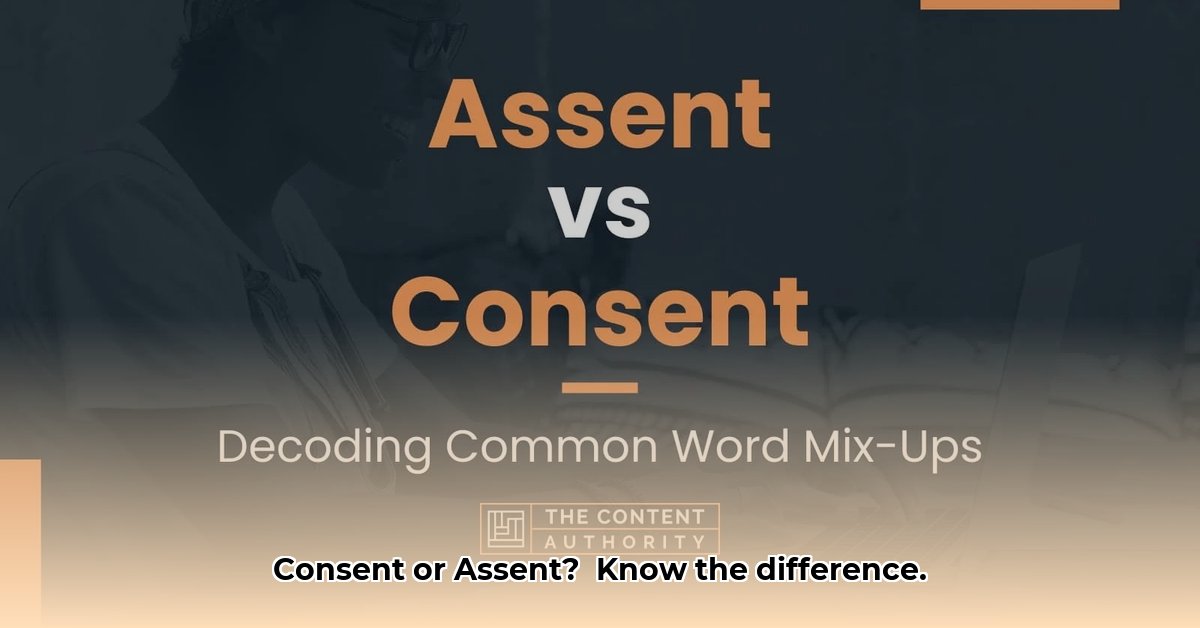Defining Consent and Assent
Consent and assent both involve agreement, but they differ significantly in legal weight. Consent is the informed, voluntary, and legal agreement of someone with the capacity to make that decision. Assent, however, signifies agreement or willingness from someone who isn’t legally capable of providing full consent, such as a minor.
Why the Distinction Matters
Confusing consent and assent can have serious legal and ethical ramifications. Respecting individual autonomy and protecting vulnerable populations depends on understanding this crucial difference. True consent involves capacity (the ability to understand and make the decision), information (having all the relevant details), and voluntariness (agreeing without coercion). Assent involves a developmentally appropriate explanation, willingness to participate, and guardian oversight.
Real-World Examples
Consent and assent appear in various contexts:
- Healthcare: A patient signing a consent form before surgery represents consent. A teenager agreeing to a medical procedure after their parent provides consent demonstrates assent.
- Research: Parental consent is required for a minor to participate in a research study, while the minor’s agreement represents assent.
- Legal: A homeowner allowing police to search their property demonstrates consent. A team member agreeing to a new project proposal in a meeting is more akin to assent.
Obtaining Consent and Assent in Research: A Step-by-Step Guide
- Obtain Parental/Guardian Consent: Provide the minor’s parent/guardian with comprehensive information about the research study, including purpose, procedures, risks, benefits, and the right to withdraw.
- Seek Assent from the Minor: Explain the study to the minor in developmentally appropriate language, ensuring they understand their participation.
- Document Everything: Maintain thorough records of both parental consent and the minor’s assent.
Navigating Complexities and Gray Areas
Situations involving “mature minors” or varying cultural norms require careful consideration. The legal and ethical landscape surrounding consent and assent is constantly evolving. Ongoing research and legal developments continually refine our understanding.
Consent vs. Assent at a Glance
| Feature | Consent | Assent |
|---|---|---|
| Legal Authority | Required | Not Required |
| Guardian Role | Not applicable (unless individual is incapacitated) | Required for minors/incapacitated individuals |
| Significance | Legally Binding Agreement | Agreement/Willingness |
Frequently Asked Questions (FAQ)
Before the Research/Procedure:
- What does “informed consent” really mean? Informed consent means you understand the purpose, procedures, potential risks and benefits, and alternatives before agreeing to participate. It’s crucial you have all the information you need to make a well-considered decision.
- What if I don’t understand something in the consent form? Don’t hesitate to ask questions! It’s essential you have a clear understanding before signing anything.
During the Research/Procedure:
- Can I change my mind after giving consent/assent? Yes. You have the right to withdraw your consent or assent at any time, even if you’ve already started the research study or procedure.
After the Research/Procedure:
- Who do I contact if I experience unexpected side effects? Contact the research team or medical provider immediately. They will provide guidance and any necessary care.
- Where can I find more information about my rights? Your local Institutional Review Board (IRB) or an informed consent advocate can provide additional resources and assistance.
Further Exploration and Resources
For more in-depth information, explore these resources:
- Office for Human Research Protections (OHRP): Part of the U.S. Department of Health and Human Services, this office oversees research involving human subjects.
- Your local Institutional Review Board (IRB): IRBs review research protocols to ensure they are ethical and protect participants’ rights. Contact your institution or organization for information on your local IRB.
This article provides a foundational understanding of consent vs. assent. However, the field is constantly evolving, and legal and ethical considerations can be complex. Consulting with legal counsel or ethics experts is recommended when navigating particularly nuanced situations. While we strive for clarity, ongoing discussion and research are essential to ensure we are acting ethically and respecting individual autonomy. It is important to remember that current research suggests that capacity is not a fixed entity and can fluctuate based on individual circumstances, and that cultural context significantly influences the understanding and application of these concepts. Further, ongoing discussions and research are necessary to refine our understanding and improve practical application of assent and consent processes.
- Cooking Kits Make Mastering New Recipes Fun for Everyone - February 4, 2026
- Leak-Proof Glass Food Containers with Locking Lids Keep Food Fresh - February 3, 2026
- Glass Storage Containers With Glass Lids That Lock for Freshness - February 2, 2026










